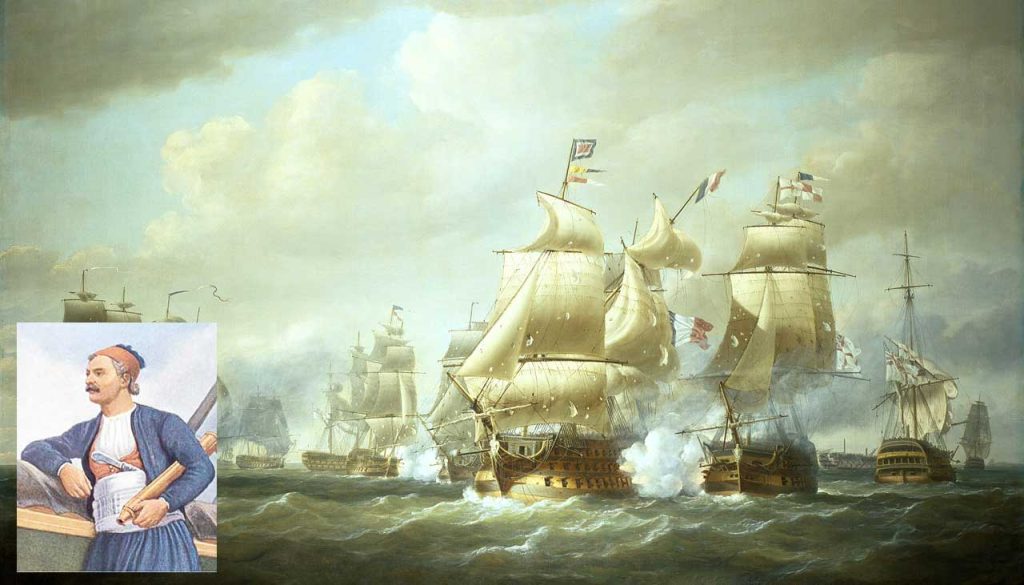In the late 18th century and early 19th century, Hydra developed into a major naval power with a merchant fleet of 150 ships. The new possibilities given to Greek commercial shipping by the Russo-Turkish treaty of Kiucchuk Kaynardzi (1774), together with the favor of the Ottoman Porte, in return for the naval experience of the Hydraians who served in the Turkish fleet, gave great wealth to the island.
At the same time, however, they created fertile ground for intense confrontations to occur between the Hydraians, anarchy, looting and murder, with the Provosts being unable to maintain order. The culmination of all this was the murder of the father of Lazaros Kountouriotis, which resulted in the uprising of most of the people of Hydra, who together with the Provosts asked the Gate to send to Hydra an authorized Governor, responsible for enforcing public order .
Then Kapudan Pasha Küçük Hüseyin, Commander-in-Chief of the Turkish Admiralty, placed in Hydra on December 29, 1802 his favorite, Hydra Captain of the Turkish fleet Georgios Dima Voulgaris, whom he named Mitas Kotsambasi (Commander of Hydra) and Naziri (Observer) of Poros and of Spetses, for some time. Along with Voulgaris, he appointed a certain Turkish Hasan Çausis as Zambiti (Policeman), in order to enforce the broken order.
On January 1, 1803, Voulgaris elected ten prefects as his advisors and collaborators and at the same time appointed a militia. With this mission, on the one hand, the island ensured its self-government, and on the other hand, Georgios Voulgaris, the “Bey” as the Hydraians called him, with his prudent administration managed to reduce the island to a model favored place and himself to emerge to a great personality for the place.
Georgios Voulgaris proved to be a political genius, gathering many virtues, moderate and consensual, he managed to impose himself on the Argosaronicos from Aegina to Spetses. The decade of the administration of Hydra by Voulgaris must be characterized as “Golden” for Hydra, because then peace prevailed and great riches were accumulated in Hydra.
The period of economic strength, the relative suppression of piracy and the internal peace that followed the reign of Georgios Voulgaris, gave the Hydraians the opportunity to organize their society as they wanted, while the constant battles that the Hydra crews were forced to fight with the pirates, who at that time ravaged the Mediterranean from end to end, transformed them over time from insignificant farmers and shepherds, into daring and experienced sailors.
The important position that Hydra held at that time in Greece and in the rest of the world is proven even by the existence of so many Consulates in Hydra, which shows that all the great powers of that time had interests in Hydra.
Russia had Anastasios Laz. Kokkini, consul in Hydra from 1803 to 1806. Kokkini with secretary Dim. Kontoleonta. In 1806, Grig. Skardamitsis with Hieronymos Skordalios as secretary. In 1821 the consular agent of Russia was Ioannis Klados.
Consul of the Ionian State, when the island was under Russian occupation, was Lazaros Kountouriotis. Consul of France was Eleftherios Ghikas. Consul of Austria was Theodoros Emm. Serros from 1807 until 1823. Finally consul of Great Britain from 1818 was a Vitalis.
At this time, Hydra was used as a Naval station, as a result of which it pioneered maritime trade and communications, as a result of the privileges of free navigation under the cover of the Russian flag.
This had as a result that at this time the island, controlling the maritime trade, experienced its greatest power and by extension its economic and spiritual flourishing. The Hydra gradually became masters of the sea routes of the Mediterranean and Hydra emerged as the first naval power among the Greek islands.
In addition, during this period the Hydraians took advantage of the Anglo-French conflict and made huge profits, breaking the blockade that England had imposed on the ports of French territory, during the Napoleonic wars.

The Revolution finds Hydra possessing an untold wealth of gold coins of the time, mainly the result of its successful involvement in the wheat trade during the Napoleonic wars, although the trade showed a slight decline after 1810. It is therefore fully understandable, why the moment of the beginning of the struggle in 1821 found this small and until then insignificant island of the Argosaronic, to have about 27,000 inhabitants.

